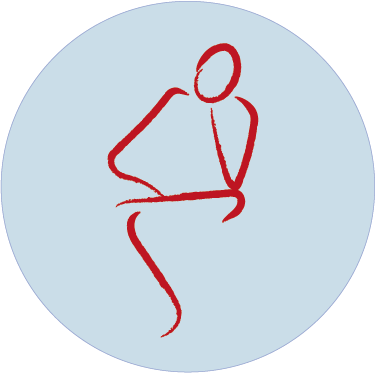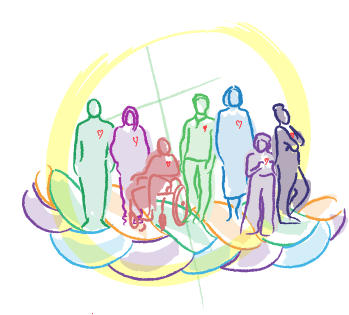Elders as a team
| Site: | URC Learning Hub |
| Course: | Exploring Eldership |
| Book: | Elders as a team |
| Printed by: | Guest user |
| Date: | Thursday, 3 April 2025, 4:47 PM |
Description
This part of the course explores the importance of Elders working as a team - amongst themselves and with the wider church community.
1. Introduction
In this module you will explore how important
teamwork is to the eldership role. You will be given the opportunity to
explore how teamwork within the church stems back to New Testament times. You will also see that whilst teamwork is critical to the mission of the church,
there are times when a dissenting voice is constructive and takes God’s mission
forward.
In this module you will:
- look at the responsibilities of Elders as a team
- reflect on the teams that Elders are called to be a part of
- consider the use of a 'dissenting voice' within a team
2. First thoughts
 Before we look at what others think reflect a little on these questions:
Before we look at what others think reflect a little on these questions:
- how do you see elders operating as a team in your church? Is it constructive?
- what has teamwork achieved within your church life? Has it been positive in its impact?
- have there been times when a dissenting voice has had an impact on the future path of the church? In what way was that voice heard?
3. The call of Elders
Asking Elders to act as a team is rooted in the early days of Jesus’s call to the disciples. He called and was accepted, by 12 men, all of whom had different skills, mindsets, and experiences. Together, over time, acting as a team, they moved forward God’s will. By effective use of their talents, they moved the creation of God’s church forward and expanded knowledge of the good news that was evident through Jesus' ministry. This did not happen by accident. Their success was by design and as a direct result of each using the skills and attributes that God had given them and in a mutually complementary way.
4. Thinking about what a team is
Why is it important for elders to consider themselves as, and to act as, a team?
Even though we are called as individuals, we fulfill our ministry by working effectively with others. It is clear that team working is an important part of eldership. As Elders, we have responsibility for ensuring that key functions of our local and the wider church are fulfilled.
Something to think about:
 What are the key functions, skills and experience you need in a team of Elders? Why?
What are the key functions, skills and experience you need in a team of Elders? Why?
5. What is a team? - in practice
The United Reformed Manual cites 12 key responsibilities for the Elders of a church to deliver. These cover a range of activities from worship, mission, church administration, and education. (Click here to review the function of the Elders' meeting)
It is in the Elders’ meeting that these responsibilities are taken forward either through collective decisions or, possibly, by collective decisions based on work done by smaller delegated groups that report back to the Elders' meeting.
The range of responsibilities that Elders hold calls for a wide range of skills. No one person would have all the appropriate skills, attributes, or time, to fulfill all of these needs! In the same way that, together, the apostles established the early church by bringing together their disparate skills, we too can discern God’s will and move forward God’s vision for our church today.
6. The Church as a team
 So who are the team players within a church? The elders are not the only team. Your
church is a united, one-team, working together.
So who are the team players within a church? The elders are not the only team. Your
church is a united, one-team, working together.
Certainly, the Elders have key responsibilities for ensuring the delivery of vital aspects of our church life (more about these in the module 'Governance'), but they are not alone. Members and adherents have responsibilities too!
Collective decisions are taken to the Church Meeting, which confirms the approach and actions to be taken. Elders in this instance are working as a team within the wider Church team and are accountable to the church meeting.
There may also be sub-teams operating for specific purposes within the church. For example, your church may have a team of people responsible for pastoral care, for youth and children’s activities, for fabric and buildings, for worship, etc. These smaller, topic focussed groups are still accountable through the eldership to the wider church team as a whole. Yet through each of these teams, the aim of working together is to discern God’s will for the church and the communities we serve.
7. The dissenting voice
Not all teamwork is harmonious all the time. There are difficult decisions to be taken, and different voices and opinions to be heard in order to discern God’s will. There are examples on the next page, in the case studies section, of when the small, dissenting voice, has caused the church to ‘change direction’.
Sometimes the doubts you feel may be God challenging the direction being considered. In these circumstances, it would be wrong not to voice your opinion! God may speak through you no matter how new an Elder you may be. Do not hold back your thoughts because you feel others may be more experienced but, having said that, do not approach dissent in a combative manner. Speak constructively and pray for God’s guidance. But be assured - your opinion matters! And, working together, we are more likely to discern God’s will.
8. Case studies
![]() Watch this video to see Elders talking about working as a team:
Watch this video to see Elders talking about working as a team:
Click this link for a transcript of the video
Click here to download this video as a file (opens in new window)
9. Review
 Remember those notes that you made at the beginning of this module? Now would be a good time to review them and ask yourself:
Remember those notes that you made at the beginning of this module? Now would be a good time to review them and ask yourself:
- what have I found out in this module that I didn't know before?
- what else do I need, or want, to know?
then have a look at the next page.
10. Taking things further - new
![]() How can I find out more?
How can I find out more?